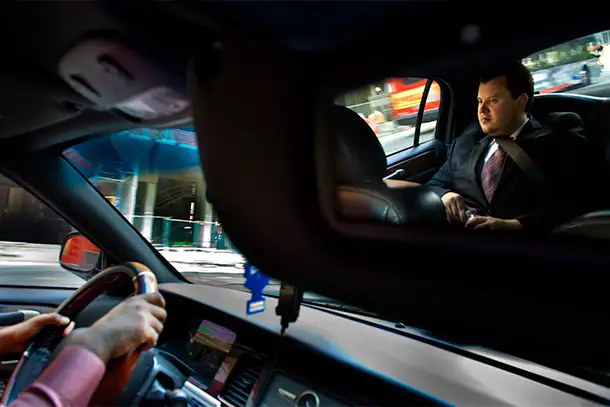
Ride-sharing services Uber and, to a lesser extent, Lyft have taken the ground-transportation industry by storm, quickly becoming the go-to solution for local trips, especially among the younger all-things-digital generation.
Compared to traditional taxi services, Uber is easier, cheaper, and in many cases features friendlier service. Plus there’s the cool factor.
But among business travelers, Uber and its ilk have been slower to gain traction. And there’s a reason, a hurdle that won’t be easy to overcome: corporate travel managers.
In large- and medium-sized companies, travel managers set policies regarding everything from per-diem compensation to which airlines employees should patronize. And they’re leery of ride-sharing services.
According to a new study by the Global Business Travel Association, 24 percent of surveyed travel managers report that their companies ban the use of ride-share services by their workers when traveling on business. And a significant proportion of the others simply haven’t yet formulated a policy.
For many travel managers, the worry regarding ride shares falls under the heading of “duty of care.” That refers to a company’s responsibility for its worker’s safety during business trips, and the potential liability should a business traveler be injured or killed while on the job.
Among travel managers, 95 percent rated vehicle safety as among the highest priority, easily trumping convenience, cost, timeliness, and other considerations. (For business travelers themselves, 79 percent rated vehicle safety as especially important.)
RELATED: Uber Rides Now Earn Hotel Points
And here’s the problem: For all their strengths against other transportation options, ride-share services are widely perceived to be less safe. According to the study:
Some in the industry question the safety of TNC [ride share] drivers and their vehicles due to the lack of regulation imposed on them in many areas, including less stringent or no minimum insurance requirements, driver pre-employment certifications, driver training and knowledge requirements, and ongoing driver safety checks.
The safety questions posed by ride sharing have done little if anything to stem the enthusiasm for such services among consumers at large. So it’s possible that travel managers will eventually lighten up as well. But the fear of jeopardizing one’s job is always a strong force for adopting more rather than less conservative policies.
Given the size of the potential business-traveler market, the smart move by Uber, Lyft, and others would be to preemptively shore up their own safety-related policies. Sure, there would be a cost associated with doing so. But Uber, for one, can certainly afford it.
Reader Reality Check
Do you use Uber when traveling on business? Any safety concerns?
More From Smartertravel:
- 10 Most Important Safety Tips for Travelers
- Seven Worst Rental-Car Rip-Offs (and How to Beat Them)
- Seven Safety Tips for Road Trips
This article originally appeared on FrequentFlier.com.
We hand-pick everything we recommend and select items through testing and reviews. Some products are sent to us free of charge with no incentive to offer a favorable review. We offer our unbiased opinions and do not accept compensation to review products. All items are in stock and prices are accurate at the time of publication. If you buy something through our links, we may earn a commission.
Related
Top Fares From
Today's Top Travel Deals
Brought to you by ShermansTravel
Shop and Save with Country Inns...
Patricia Magaña
 Hotel & Lodging Deals
Hotel & Lodging Deals
$229 -- Chicago: Discounted Rates and...
Francesca Miele
 Hotel & Lodging Deals
$229+
Hotel & Lodging Deals
$229+
$188 -- Honolulu: Save on Oceanview...
Abigail Lamay
 Hotel & Lodging Deals
$188+
Hotel & Lodging Deals
$188+



